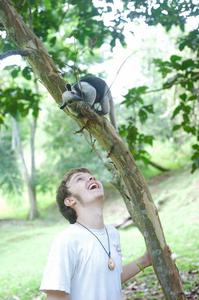ESP Biography
DUNCAN COLEMAN, Social Scientist, Conservationist, Behaviorist
|
Major: Anthropology College/Employer: Stanford Year of Graduation: 2020 |

|
Brief Biographical Sketch:
Hi! I am a Sophomore interested in human-animal relations - whether that be animals in Chinese literature, Ghandian ethics, indigenous conflicts, zoo welfare or behavioral psychology. To encompass my broad cross-disciplinary interest, I am majoring in both Anthropology and Biology. History was my "thing" in high school (I was the state champion in Social Studies for two years). And I have been fascinated with animals ever since my first dog Finley - a white retriever-lab mix. My interest in the humanities and non-human beings (how ironic, huh?) has led me to become somewhat of a renaissance man dabbling in a variety of academic departments at Stanford. I was born in Melrose, Scotland and grew up in Canyon Lake, Texas - a small town in the Hill Country. And no, I know what you are thinking - I am not your stereotypical Texan. I do not listen to country music or wear cowboy boots or harbor plots of secession from the United States. My favorite class is Hindi, I love funk and indie music, I am a vegetarian, and I have raised 3 baby anteaters in South America the last three summers. I interned as a Zookeeper in Costa Rica and an Animal Rehabilitationist in Suriname (look it up, it is an actual country) and volunteered at a forestry conservationist reserve on the Galapagos Islands. From my experience, I have formed a belief, which guides my passion: It is not so much the lack of capacity of non-humans that leads to their inhumane treatment, but the lack of our capacity to imagine and empathize with different perturbations of selfhood. Through my work, I hope to bridge the arbitrary divide we have set up between the human and natural spheres and connect people to animals. I hope you enjoy my class if you decide to take it! Past Classes(Clicking a class title will bring you to the course's section of the corresponding course catalog)H5624: The End of Zoos: Ethical Legitimacy and the Legacy of Imperialism in Splash Spring 2017 (Apr. 22 - 23, 2017)
Our relationship with animals takes a variety of forms. We imagine animals as family members when they are our pets, use them as characters for our children's stories as metaphors for the human condition, consume them in our everyday meals as food, watch them in their wild habitat at nature parks, and keep them caged in zoos for our entertainment and education, and their conservation in the wild.
As ethically and historically conscious thinkers, we must constantly re-examine our personal, everyday relationship with animal life and how, as a collective humanity, that relationship has evolved over chronological time. By doing this, we come to understand, question, and revise our contemporary values as a society. Zoo’s make a perfect case study for exploring the growing field of animal ethics.
As legacies of European Imperialism, zoo’s reveal the continuing narrative of mastery of nature and dominance over other forms of life, including ourselves (some zoos did display more “primitive” humans since 1956). Evolving from it’s questionable origins, zoos today are largely held as bastions for species survival and pillars for fostering environmental literacy. They display the animal kingdom’s greatest hits, offering us the chance to see the globe through a microcosm of the world’s greatest mammalian megafauna. We can go to a zoo today and see elephants traversing a tiny “African Dirt-land,” or Snow Leopards lounging lazily in the “Concrete Himalayas,” or even rare Polar Bears melting under the California sun on white-painted rafts in a “fun-sized Arctic Ocean.”
Today, growing public awareness of animal consciousness has sparked debates about the ethical nature of zoos. Zoos are under attack by animal rights activists, who criticize them as commercial institutions who prioritize profit margins and entertainment over animal welfare. Zoo's tell us a different side of the story - they tells us that they allow visitors to have a unique connection to the natural world people would otherwise not have access to. Zoos, as commercial and conservation institutions, must perform an ethically precarious balancing act of many conflicting concerns – weighing animal welfare with enclosure aesthetics and ‘natural’ education, wildlife conservation investment with profit margins and entertainment, and, most significantly, the fostering of a benevolent caretaker relationship with nature with the tendency to tell an implicit narrative of human dominion and superiority over nature.
In this class, we must ask ourselves difficult ethical questions: What is the end or mission of zoos? Why do we confine animals in enclosures for us to see, instead of letting them be free in the wild? What distinguishes man from animals to justify our treatment of them? What narrative are zoo’s telling us about nature and humanity’s role in the world? Why do we value some species of animals over others for display in zoos? Are these choices arbitrary or justifiable? Given contemporary nature documentaries and rapidly declining travel costs, why do zoos still appeal to us? And finally, should zoos be banned altogether or should they be improved? If the latter, how should they be improved?
In this class, we will re-examine our human-animal relations through the lens of the zoo. We will delve into the zoo’s dark historical origins and how its mission has evolved over historical time. Then, we will tackle the variety of ethical concerns that arise upon contemplation of the end of zoos: the globally ubiquitous commercial enterprises and conservation institutions we visit to see a microcosm of the world.
|
|
